- Home
- Ninie Hammon
Trapped (Nowhere, USA Book 3) Page 13
Trapped (Nowhere, USA Book 3) Read online
Page 13
She turned and ran. He was between her and the parking space so she couldn’t make for her car. All she could do was run away in terror through the trees.
Her flight was wild and panicked, racing through the dense woods, dodging around bushes. No destination in mind, just the blinding terror in her chest that propelled her forward.
He had been planning all along to commit murder.
Dear holy mother of God, Sugar Bear — Howie Witherspoon— intended to push her off the cliff. He was going to kill her.
The thoughts didn’t connect logically in her head but the general gist was all she needed anyway. That was the reason he’d wanted to meet her here. Not because he was sentimental about the first place they’d made love. Not for nostalgic, romantic reasons, to tell her goodbye, maybe make love to her one last time, tell her he loved her and would wait—
No. He had made their meeting here because he intended to shove her off the Scott’s Ridge Cliff. How could …? Why would …?
Toby Witherspoon’s words floated up inside her from the depths of her memory. The little boy had asked God to make his father stop hurting his mother. Hurting his mother. Howie Witherspoon was a violent man. Why couldn’t she have figured that out from the terror on his son’s face whenever she saw him? How Toby cringed away from him, went stiff when Howie hugged him. She had seen all that, noted all that and then categorically refused to make the mental connections that the clues implied.
Howie had been abusing his wife and maybe even his son for years. He wouldn’t shrink from hurting her — he’d had lots of practice hurting people.
Hayley stumbled over another root, clumsy in the army boots. The root was snaking out from the trunk of a big oak tree and she almost went down, caught herself on the trunk and stopped, panting, crying, too, though she couldn’t feel herself crying.
Over the hammer blows of her heart banging in her chest so hard she could see the Eastern Kentucky University tee-shirt logo move with each beat …
Over the ragged panting of her breathing that rasped painfully in her throat …
Over the loud buzzing sound that now filled her ears …
She could hear him. Freezing, she held her breath.
He was coming through the trees behind her.
Chapter Twenty-Six
It was going to sound crazy, Charlie knew. But she couldn’t let everybody leave without saying anything. She and Sam and Malachi had agreed. It was important.
“I wasn’t supposed to be the one to say this,” she stammered. “It was supposed to be Malachi.”
“My Malachi?”
Viola pulled the attention back to the stage. She looked genuinely surprised.
“Yes, Malachi—”
“He didn’t never mention to me he’s planning on giving a speech.”
Charlie didn’t know how to respond to that. Malachi had been spending a lot of time at the hospital with Sam and Charlie. She didn’t know what he ordinarily did with his time, but surely he had been spending less of it with his mother than he had been since the Jabberwock.
“He and I and Sam … we’ve been talking, you know, trying to figure it all out. The Jabberwock.”
Charlie realized as she spoke that she had been put in her place. That Viola had re-established herself as the person in charge, the person who was to be listened to. Instead of addressing the crowd, Charlie was answering Viola Tackett’s questions. Like a good little girl.
She resolutely turned to speak to the others in the room.
“We can’t leave here tonight without talking about something more important than whether or not somebody’s hay rake got stolen.”
“Ain’t nothing more important than establishing peace and order among ourselves. The nowhere people got to stick together.”
That hit Charlie like a drop of water in hot grease.
In one sentence, Viola had set up an us-versus-them mentality. Viola and everybody else in the room was us and Charlie was them. Well, that wasn’t going to happen.
“Don’t make it sound like I’m some outsider, some flatlander from away from here,” she snapped in a tone she suspected was not used often with Viola Tackett. “I grew up here. My mama was Sylvia Ryan. She made pottery, bowls and … she gave ceramics classes.”
She had to establish some street cred.
“My daddy left Nower County in 1967 for Vietnam and never came back. Missing in action. Killed in action. We never knew. But the three of us, me, my mama and my sister Mallory made our lives right here in a house at the foot of Little Bear Mountain.”
Though she wasn’t looking at Viola Tackett, she could feel displeasure pulsing off her in waves.
“I’m nowhere people, same as you.”
“Where you been all these years?” Viola said, feigning simple curiosity, but Charlie was quickly learning that the dumpy little woman with the big bun of black hair — who was still holding a rifle on the crowd — didn’t do or say anything that didn’t push forward her own personal agenda.
“You don’t stop belonging to the club just because you move away,” she snapped, and would not look at Viola Tackett — aware that a look from Viola right now would cause internal bleeding.
“We are all in this together whether we like it or not because not a mother’s child in this room can get past the borders of Nower County, no matter how important you are” — she looked at Sebastian Nower — “or how powerful you are.” She did not look at Viola Tackett but she was sure the meaning was not lost on her. “Or how famous you are out there in the wide world.”
Only a handful of people knew Charlie was really the bestselling children’s novelist C.R.R. Underhill, but she would wager Viola knew it, because she didn’t imagine there was much that went on in this county that escaped her notice, even if she did live in a log cabin on a mountainside out past Killarney, without a phone or indoor plumbing.
“We’re stuck here together — but that’s not the worst of our problems.”
There was a murmur in the crowd.
“What’s happening here … it’s more than just a mirage you can’t cross or you end up puking your guts out in the Dollar General Store parking lot.”
“How do you know—?”
And Charlie actually cut her off.
“I don’t know. None of us knows. But I will tell you what we have seen and what we understand — Malachi, Sam Sheridan … and,” she choked up and had trouble getting the words out through her clogged throat, “Liam Montgomery and I have seen things maybe the rest of you haven’t. Or if you have, you didn’t take any note of them. Or pretended you didn’t see at all.”
“What things?”
“Old houses.”
“They’s lots of old houses in Nower County, empty that somebody moved out of” — Viola said the rest with a sneer — “to go live somewheres else.”
“Oh, come on, you know I’m not talking about that.” The words sounded dismissive and disrespectful — and that was just fine with Charlie. “I’m talking about the old houses that just got old, the ones that looked like yours one day and the next day they’ve aged a hundred years. You’ve seen them, don’t tell me you haven’t.”
The crowd was silent then. Even Viola Tackett kept her mouth shut.
“Don’t you wonder what happened to those places?”
“Do you know what happened to them?”
“No, not exactly, but—”
“Well, if you don’t know what you’re talking about why are you taking up our valuable time—?”
“I know what’s happened to the people who used to be in those houses.” She let that soak in before she continued. “And so do you.”
She made eye contact with Betty Ann Gribbins, who’d either paid Bobby Joe Mattingly for a bunch of chickens or hadn’t. She looked at Bobby Joe and his wife, Norma Jean, who had a strawberry birthmark covering one whole side of her face. Bobby Joe looked away, Norma Jean looked scared.
She looked at Thelma Jackson, who’d taught hist
ory at the high school and Thelma met her gaze straight up and held it for a beat. Gave a little nod, too, or maybe Charlie imagined that part.
She looked at Ethel Crump, who’d hidden from the Jabberwock in her basement, Billy Dan Singleton, who’d lost his souped-up Chevy and Becky Sue Potter who might just have that baby right there on the auditorium floor.
“You know, you just don’t want to look at it, don’t want to admit it’s real because if it is—”
“What are you talking—?”
“People are vanishing!” She cried out the words with emotion that might have sounded like weakness, or hysteria, but she couldn’t help it. “Abner Riley, Harry Tungate, Reece and Cissy Tibbits and their girls, Sue-Sue and Patty. There are more, a lot more I don’t know about, but those half-dozen are enough. One minute the house is here, and folks are fixing breakfast, and the next minute the house is a falling-down, hundred-year-old shack and the people are … not there. Vanished.”
“What is it you’re trying to say—?”
Charlie whirled on her and the fire in her eyes matched Viola’s spark for spark.
“What I am saying — that your son, Malachi, was going to say here tonight — is that it’s not enough to kick back with a beer and go on with life just like you’ve always done.”
“Why ain’t it—?”
“Because you’re wrong.” She literally spit the words out at Viola, then turned and said the rest to the crowd. “About two very important things.”
She held up one finger.
“You think the Jabberwock’s going to go poof in a puff of smoke and be gone when you wake up in the morning and then you can go on up to Lexington to get new tires for your truck or over into Beaufort County fishing.”
She shook her head.
“That’s not true. It’s pie-in-the-sky wishful thinking. Daydreaming. The Jabberwock didn’t blow in here with the storm. It’s not some meteorological phenomenon, some explainable freak of nature that’ll work itself out. “
She held up a second finger.
“And you think that even if the Jabberwock doesn’t leave, even if it keeps you locked up here, all you gotta do is figure out how to put food on the table, maybe drink a little shine now and then or smoke some weed, which really isn’t a bad life, not all that different from how you were living before J-Day …”
“And you’re saying …?”
“That’s wrong. All of it. The Jabberwock isn’t going anywhere because it isn’t a thunderstorm or a tornado turned wrong side out. It is a being. It has a will. A purpose.”
Nobody spoke after that, not even Viola.
“This is bigger than just figuring out a way to get along with each other.” She cast a pointed look at Viola Tackett that she suspected earned her a permanent spot on that woman’s bad side. And that was not somewhere anybody wanted to be.
“It’s not just that we can’t leave! That’s not all of it. As we stay here, we vanish. It’s happening right now. The Jabberwock consumes us, we cease to exist. You can’t just sit back and make do with a life that ends at the county line. You better get up off your backside and start trying to figure out how to fight something that’s going to eat you while you sit there.”
You could have heard a mouse tiptoe across a cotton ball in the room.
“All of us are smarter than any one of us. We’ve got to figure this thing out — all of us. Together. Or the Jabberwock will pick us off one at a time until it gets us all. And we will vanish …”
Her voice lowered, not just for effect but because she had suddenly run out of enough air to finish what she had to say in a normal voice. “… just like Gideon did.”
Chapter Twenty-Seven
The black frame had returned to the edges of Malachi’s vision, the one that had formed when he was on the other side of the world, the one that only left him occasionally, when he was working with the others at the Middle of Nowhere, when he was …
What?
Engaging with the world? Was that all it took? Get out there and make nice with folks, go to a few parties maybe, ask a girl to dinner … in other words, get on with life. Did you just have to decide that’s what you were going to do and the black frame would go poof in a puff of smoke, wouldn’t continue to close in on your vision until you could only see the world through a small hole formed in it? And when it closed up altogether, you couldn’t see the world at all.
No, that wasn’t right. You saw the world. It just wasn’t the real one out there beyond your fingertips. It was the one that only existed in your head, the world of horror and blood and death.
Malachi grabbed his thoughts, understood that he was perilously close to the point that he’d be shoved out of the driver’s seat of his own life and his own reality, and taken on an all-expenses-paid vacation into hell.
Focus.
“Malachi.”
The word seemed to come from a long way off, like at the bottom of some very deep well. But it was just Roscoe, driving his truck toward Harry’s house, desperate to find out what had happened to his twin brother.
Malachi knew Harry was gone, though. Roscoe probably did, too, but you had to try, had to look. You couldn’t just accept that uh oh, here’s another one. Somebody who was walking around in the sunshine yesterday — gone, poof, vanished. You couldn’t just take that and move on.
But what could you do? In the face of something like that, what could …?
Something. Anything. Everything was preferable to nothing at all.
Harry’s little house was at the bottom of a rise, with Dragon Root Creek running past it not fifty yards from the house. Malachi wondered if the house had ever flooded because the creek was such a close neighbor. He doubted it. Flooding in the mountains wasn’t a common problem because flooding was caused by a creek backing up and creeks here ran straight down the hillsides, carried their water out into the flatland. Once there, if something got in the way, a creek would back up then, spread out of its banks and into the yards, basements, even the second floors of some houses.
Mountain folks had a saying for when the creek was full and running fast: “Creek’s a’rushin’ out there to defile the flatlands.” Or they’d say, “pee runs downhill, too.”
As soon as Roscoe passed the stand of trees that blocked the view of Harry’s house, Roscoe cried out.
“No … noooooo!”
Malachi had only been to Harry Tungate’s house once, and that was when he was a little boy, come to ask did Harry mind if he and his brothers went hunting in Harry’s woods. There’d been rumors that somebody’d spotted elk in the northern part of the county and the Tackett boys wanted to bag one if they could. Asking was just a courtesy. Harry didn’t own the woods around his house. He owned the little plot of land where he raised a small amount of tobacco and Malachi suspected an equal amount of weed, had a garden and apple trees and the standard menagerie of farm animals, chickens for eggs, a milk cow, sheep, pigs and guinea hens. It was just a thing you did so a man wouldn’t suddenly hear the sound of gunfire nearby and rush out into the woods packing.
Just that one visit hadn’t printed a vivid image of the house in Malachi’s mind but it didn’t matter what it’d looked like then. Now it was a collapsed shack that barely resembled a house at all.
Roscoe roared down the hillside to the bottom, popped the clutch to kill the truck, leapt out and went running toward the pile of rotted timber, calling out, “Harry, Harry, where you at? You answer me, now, you hear. Harry!”
Then he started digging through the pile of rubble, calling out his brother’s name in a ragged voice that hardly seemed human. The way you’d do after an avalanche, frantic to find your loved ones buried in the snow. Malachi got out and joined Roscoe, but didn’t dig, just stood there beside the thing that was not a house anymore. Feeling the cold pulse off it like heat pulsed off a potbellied stove in the dead of winter.
“Malachi, come on. Help me dig. Help me find him.”
“He’s not here,” Malachi
said as kindly as he could. As soon as he had begun to feel the cold from the house, that felt like the draft of icy air that had belched out of Abner Riley’s house, the black frame around his vision began to expand. Getting thicker and thicker. Pulling him inward away from reality. Sucking him down into the black depths of his own soul.
When Roscoe spoke, his voice was anguished, each word a separate pain. “If’n you ain’t gonna help, go on — get back in the truck.”
The black frame slammed shut with a bang in front of Malachi’s nose.
“Get back in the truck, soldier,” Sergeant Moretti says. “We’re pulling out.”
Malachi can’t believe even Sergeant Moretti could be that heartless.
“Sarge, we can’t leave now. They won’t do anything as long as we’re here, but as soon as we leave …”
Malachi’s squad is on a dirt road beside a cluster of houses, just outside Kigali, where the small contingent of American soldiers are stationed, tasked with guarding the airport, keeping it open so that evacuations of nationals from France, Belgium and other European countries can continue.
“That’s not our problem,” the sergeant said, then spouted the phrase he had used dozens of times, a phrase that said a whole lot more than the words. “Not our circus, not our monkeys.”
A lame attempt at humor to cover up the fact that the man’s a racist. As long as he is charming, his disregard for the lives of the black civilians here isn’t so obvious.
There are probably two dozen people, clustered from all the houses into the one on the end by the road. The men, women and children belong to the Tutsi tribe fleeing in terror from the machete-wielding Hutus, who for weeks have been systematically butchering every Tutsi tribal they can lay hands on. Roads all around the airport are lined with piles of their corpses.

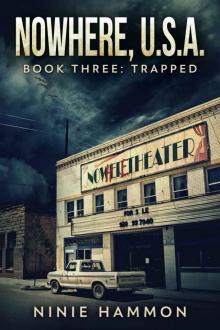 Trapped (Nowhere, USA Book 3)
Trapped (Nowhere, USA Book 3)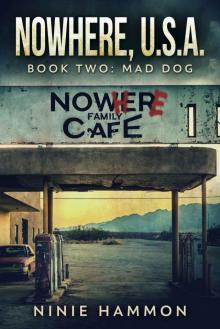 Mad Dog (Nowhere, USA Book 2)
Mad Dog (Nowhere, USA Book 2) Black Water
Black Water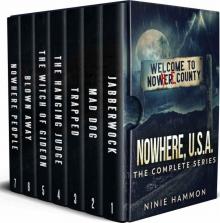 Nowhere USA: The Complete Series: A Psychological Thriller series (Nowhere, USA)
Nowhere USA: The Complete Series: A Psychological Thriller series (Nowhere, USA)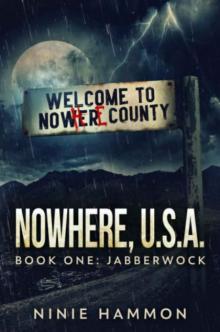 The Jabberwock
The Jabberwock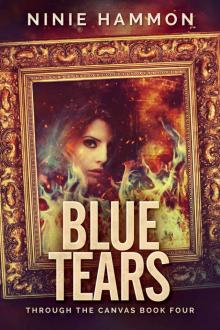 Blue Tears
Blue Tears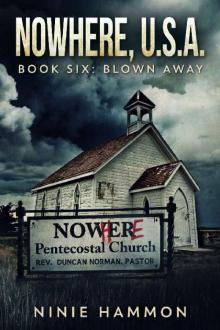 Blown Away (Nowhere, USA Book 6)
Blown Away (Nowhere, USA Book 6)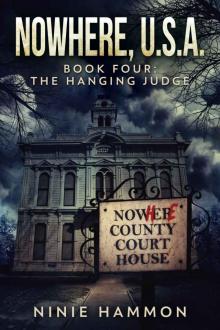 The Hanging Judge (Nowhere, USA Book 4)
The Hanging Judge (Nowhere, USA Book 4)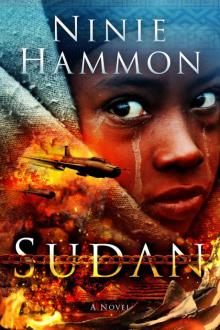 Sudan: A Novel
Sudan: A Novel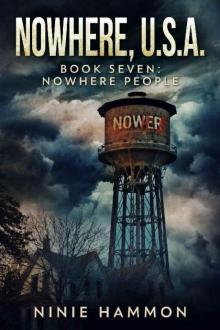 Nowhere People (Nowhere, USA Book 7)
Nowhere People (Nowhere, USA Book 7)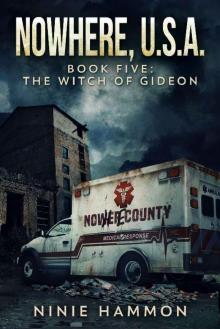 The Witch of Gideon (Nowhere, USA Book 5)
The Witch of Gideon (Nowhere, USA Book 5)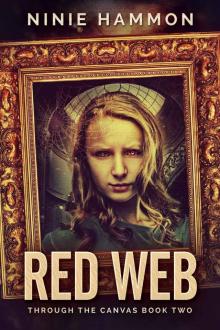 Red Web
Red Web Gold Promise
Gold Promise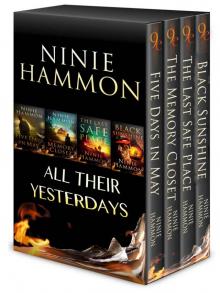 All Their Yesterdays
All Their Yesterdays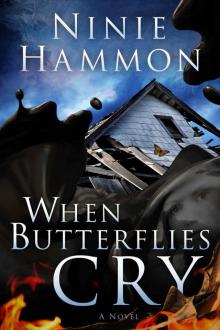 When Butterflies Cry: A Novel
When Butterflies Cry: A Novel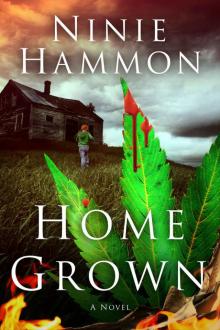 Home Grown: A Novel
Home Grown: A Novel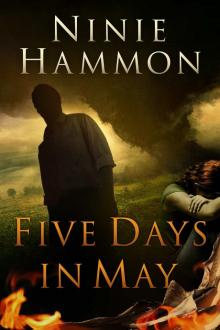 Five Days in May
Five Days in May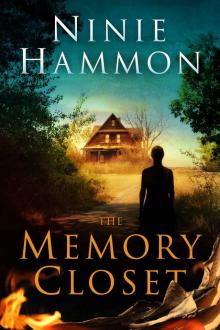 The Memory Closet
The Memory Closet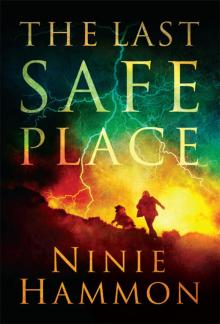 The Last Safe Place
The Last Safe Place The Knowing Box Set EXTENDED EDITION: Exclusive New Material
The Knowing Box Set EXTENDED EDITION: Exclusive New Material